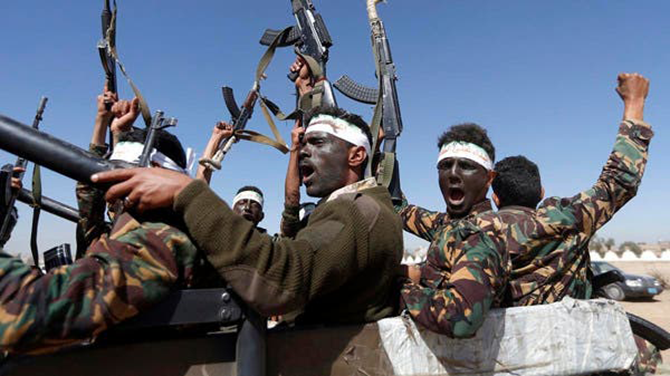AL-MUKALLA: The internationally recognized government of Yemen has expressed support for the US move to designate the Iran-backed Houthi movement as a foreign terrorist organization, despite critics claiming that it could hamper peace efforts and aid deliveries.
Yemeni Information Minister Muammar Al-Aryani said the new designation would push the Houthis into making serious steps towards peace, stop them from committing human right abuses and lead to an end to the conflict. He said the Yemeni public “favors” the decision.
“Designating Houthi militias as a terrorist group is an official and public demand and is the first step in resolving the Yemeni crisis,” Al-Aryani said on twitter, while launching an online campaign to lobby voices in support of the US decision. “Practices of the Houthi militia confirm its terrorist thoughts, behavior, practices and slogans are no different from those of Al-Qaeda and Daesh. The Houthis and terrorism are two sides of the same coin,” he added.
Yemen’s rebels seized control of the capital, Sanaa, in late 2014, and later expanded militarily across Yemen after placing Yemeni President Abed Rabbo Mansour Hadi and his government under house arrest. During the rapid military expansion that triggered the raging war, Houthis planted more than 1 million landmines that claimed the lives of hundreds of civilians, and blew up homes of hundreds of opponents.
Houthis also violently suppressed protests in areas under their control, incarcerated hundreds of activists and forced many into fleeing the country. A large number of civilians in Yemen and Saudi Arabia have been killed in Houthi drone and ballistic missile attacks.
Yemeni officials say the Houthis meet all criteria for the US designation. “No other group in the world has caused harm to its people like the Houthis,” Najeeb Ghallab, undersecretary in Yemen’s Information Ministry and a political analyst, told Arab News, adding that the Houthis should be treated the same as other Iran-backed militias, including the Revolutionary Guard and Hezbollah. “The Houthis are an extension of those terrorist organizations,” he said.
But critics and international aid officials have warned that the move “could complicate” peace efforts by UN Yemen envoy Martin Griffiths and may exacerbate the already dire humanitarian crisis in Yemen.
On Friday, UN Secretary-General Antonio Guterres said that Yemen is teetering on the brink of “the worst famine the world has seen for decades,” voicing concerns about the US decision to label the Houthi group a terrorist organization.
“I urge all those with influence to act urgently on these issues to stave off catastrophe, and I also request that everyone avoids taking any action that could make the already dire situation even worse. Failing that, we risk a tragedy not just in the immediate loss of life, but with consequences that will reverberate indefinitely into the future,” Guterres said in a statement.
Critics also said the designation could complicate peace efforts, killing hopes for ending the war. Boosted by the latest successful prisoner swap, Griffiths has been pushing to convince Yemeni parties to approve his peace initiative, known as the Joint Declaration, which calls for immediate nationwide cease-fire followed by economic measures and direct peace talks.
“It would be a mistake, in my view, to designate the Houthis as a terrorist organization,” Gerald M. Feierstein, US envoy to Yemen from 2010 to 2013, told Arab News, repeating the same concerns about the collapse of peace efforts and the potential obstruction to humanitarian assistance. “Designating them would complicate negotiations to end the war and would make US participation in negotiations extremely difficult. Moreover, there is concern in the international humanitarian community that the designation would make providing humanitarian assistance to the 70 percent of Yemenis who live in areas under Houthi control more complicated,” Feierstein said.
Despite the strong criticism aimed at the decision, Yemeni government officials claim the designation will have a positive effect.
Ghallab said that many powerful tribal leaders, businessmen and government officials who threw their weight behind the Houthis would reconsider their support after the designation. “They would desert the Houthis since their work would be criminalized,” he said, adding that the designation would refute a public notion in Yemen that some countries are working to give legitimacy to the Houthis. “The designation is a strong indication that the Houthis are rejected locally and internationally,” he said. The Yemeni official noted that there was similar opposition when the US moved to blacklist Hezbollah. “The Houthis have caused more harm to the Yemenis — more than what Hezbollah did in Lebanon,” Ghallab said.

























